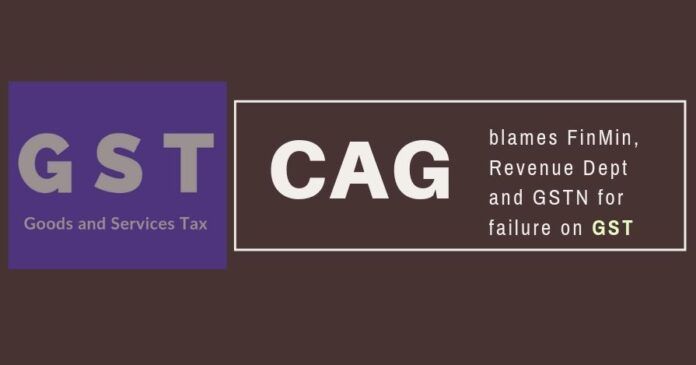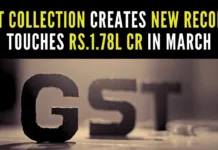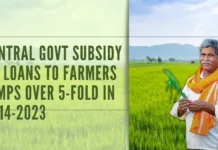
The Comptroller and Auditor General (CAG) in its first report on the implementation of Goods and Services Tax (GST) criticsed the Revenue Department under the Finance Ministry and Central Board of Indirect Taxes (CBIC) for the failures in proper mechanism and non-user friendly tax filing systems. The CAG also noted that the failures in GST implementation resulted in a drop of 10% in revenue collection and growth in collection of indirect taxes slowed down to 5.8 percent.
“The system of payment and settlement of tax that was envisaged for GST was based on one hundred percent invoice-matching and availment of the input tax credit, as well as the settlement of IGST on the basis of invoice-matching. Neither is possible as of now, as an invoice-matching system has not kicked-in. Invoice-matching is the critical requirement that would yield the full benefits of this major tax reform. It would protect the tax revenues of both the Centre and the States, it would lead to the proper settlement of IGST and would minimise, if not eliminate, the tax official-assessee interface.
“Even after two years of rollout of GST, system validated Input Tax Credit through “invoice matching” is not in place and the non-intrusive e-tax system still remains elusive. The complexity of the return mechanism and the technical glitches resulted in a rollback of invoice-matching, rendering the system prone to ITC frauds. Without invoice matching and auto-generation of refunds, assessments, etc. on the whole, the envisaged GST tax compliance system is non-functional,” said the CAG report tabled in Parliament on Tuesday, putting the blame of Department of Revenue, CBIC, Tax authorities of the state governments and the GST’s tax collection unit GSTN.
The CAG report pointed out that the Revenue Department, CBIC and GSTN failed to check the mechanism of GST collection properly before rolling out in July 2017. The Apex auditor observed that these problems occurred in the administration of GST was due to inadequate coordination among these three main stakeholders
The growth of indirect taxes of Government of India slowed down to 5.80 percent in 2017-18 over 2016-17 as compared to 21.33 percent during 2016-17, with the Government of India’s revenue from goods and services taking a 10 percent dip.
Detailing a series of technical problems in the GSTN, the CAG observed that many aspects of the technical system were totally user-friendly to the taxpayers. The auditor blamed the Finance Ministry for not allowing the taxpayer to pay tax through Debit and Credit Cards. “Facility of payment through Debit / Credit cards could not be made available as the Ministry did not decide on how to deal with the financial implications, said CAG in citing deficiencies in the taxpaying mechanism.
“While it was expected that compliance would improve as the system would stabilise, all returns being filed showed a declining trend of filing. System validations were not aligned to the provisions of the GST Acts and Rules, leaving the following crucial gaps in the GST Registration module. The system failed to validate and debar ineligible taxpayers from availing Composition Levy Scheme,” said CAG, observing that these lacunas lead to less tax collection.
CAG also said that many data of tax collection and filing mechanism details were not available to its auditors. “While acknowledging that GST is a completely new system being developed, in view of its magnitude and Pan-India impact, it is all the more necessary that due care is taken both in development and in the testing of the system before rollout. The failure to map business rules correctly and the absence of key validations in the rolled out system points to inadequacies in the functioning of GSTN,” said CAG urging for a proper transparent user-friendly taxpaying mechanism in GST.
Press Brief on GST Audit Report Final by PGurus on Scribd
- NIA confiscates Pak-harboured Khalistani terrorist Lakhbir Singh Rode’s key aide’s land in Moga - April 19, 2024
- Prime Minister Narendra Modi: A Gujju businessman who does not invest his precious time for a losing battle - April 13, 2024
- NIA arrests two accused Shazib and Taahaa in Bengaluru’s Rameshwaram Cafe blast case from Kolkata - April 12, 2024











[…] capacity of Tamil Nadu is limited as any other state in India with the formulation of the GST. The state majorly gets its revenue from TASMAC (state-run alcohol shops[1]), stamp duty, and […]
[…] खबर को अंग्रेजी में यहाँ […]
Yes but why Pgurus team is silent on the exposure of foul play n suspected hand of D.K.Shivkumar Dr g Pradhan has exposed it on his twitter handle, but NAMO is always wrong, and Italian and Vatican always right?
What is an absolute impetative as the concomittant of the CAG’s finding is to fix responsibility of each one of the officers in the Finance Ministry who are directly responsible for the mamoth debacle destroying lakha of small trader and self employed small entrepreneurs. And it must be done ASAP.
SWAMIJY HAD BETTER START AN OPPOSITION TO THIS BJP WORKINGS-AJ WAS A FAILURE AND YOU SAID IT-FOREIGN POILCY IS MUDDLED-ECONOMIC PROGRESS IS FALTERING AND POOR PEOPLE SUFFER:
IF NAMO HAS NOT GOT THE MESSGAE PERHAPS RSS CAN PUT PRESSURE ON HIM-SWAMIJY HAS THE SOLUTIONS AND IF NAMO DOES NOT LISTEN MAYBE SWAMJY SHOULD BE THE PM!!